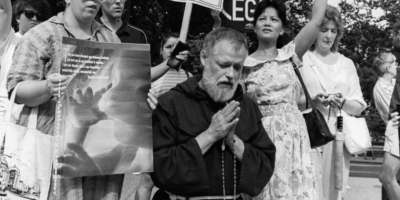Yay! Now We Can Sing ‘Em!
There’s a wonderful Hassidic saying that in heaven “the gates of neginah [melody] stand next to the gates of tshuvah [repentance].” In other words, music has the spiritual capacity to do end-runs around other, more cognitive forms of religious practice, landing us smack dab at God’s kitchen table.
That said, we’re excited by the release of Fran Avni and Linda Hirschhom’s new CD/cassette, “Selections from Marcia Falk’s Blessings in Song” [available from Half Note Productions, phone/fax 510-654-0799], which sets to music (and brings to life)21 important, new feminist-Jewish prayers from Marcia Falk’s The Book of Blessings. (Harper San Francisco, 1996). Composers/singers Avni and Hirschhorn have created exotic, textured, accessible neginahs on this album—energetic rounds, hypnotic chants, traditional cantorial pieces and spiritually transporting canons. Their sounds include Middle Eastern music, klezmer, women’s spirituality chants, cantorial melodies and potent bits of rhythm and syncopation.
Feminists through and through, Avni and Hirschhorn are committed to the idea of communal empowerment. Their album’s Uner notes actually reference the pages in Falk’s book that contain the corresponding English/Hebrew texts; it’s gratifying to find artists whose mission includes helping listeners learn and use their melodies, not just passively receive them. The notated music for some of these melodies can also be found in “The Music of Linda Hirschhorn: More Hebrew Canons, Rounds and Musical Settings” [available from Tara Publications, 1-800-TARA-400, or www.jewishmusic.com].
The Jewish-feminist prayers that Avni and Hirsch horn have chosen for this album include those for the Sabbath (many), the New Moon, food, all-purpose gratitude, peace, naming, falling asleep, and other moments of significant change in one’s life that beg for sanctification. As always, Falk’s texts bask in her signature restraint and ascetic lyricism.
Avni’s Israeli folk-style voice and Hirschhorn’s grounded, muscular one are supported by a flotilla of real musicians, not synthesizers, and this choice reflects the composers’ spiritual intent.
“Fran and I were going for real sound,” explains Hirsch horn, “with real musicians who are sweating and breathing and moving with the music. We wanted human imperfection and passion. Marcia’s prayers have been such an inspiration to me that I wanted to bring them to people at another level: from your head to chambers in your heart and body that you didn’t even know you had, until you’re moving, you’re rhythm, the insides of your body start to feel the prayers, you’re praying on different levels that you experience physically.”
On this page, we offer, as a teaser, one very simple prayer set as a round, “Blessing Before the Meal [Ha-Motzi-a].” Instead of the male God who drills us to bark, “Baruch Atah Adonai Elohaimt Melech HaOlam [Blessed are You, male God, Our Lord, King of the Universe],” the text’s low-key inclusiveness readies us to receive a God whose presence we can feel leaning towards us, so that we actually listen: “Let us bless the source of life that brings forth bread from the earth.” Really plain. The prayers create an emptiness that holds out for us the awe that is possible to feel when the clutter is gone. We become alive again to the holy ground on which we stand, and which we are. We remember that we, too, are life givers and soil. The round, of course, is the perfect vehicle for expressing implicitly feelings of collaborative wholes larger than their parts, and of pulsing cycles of renewal.


